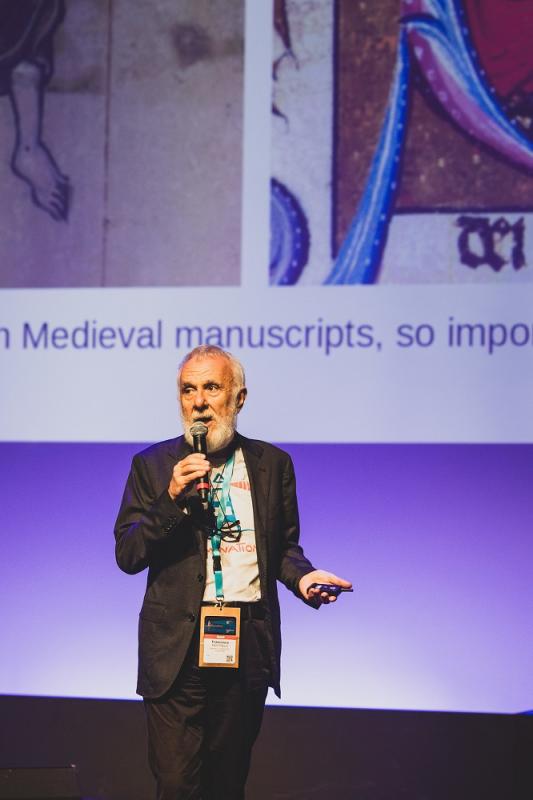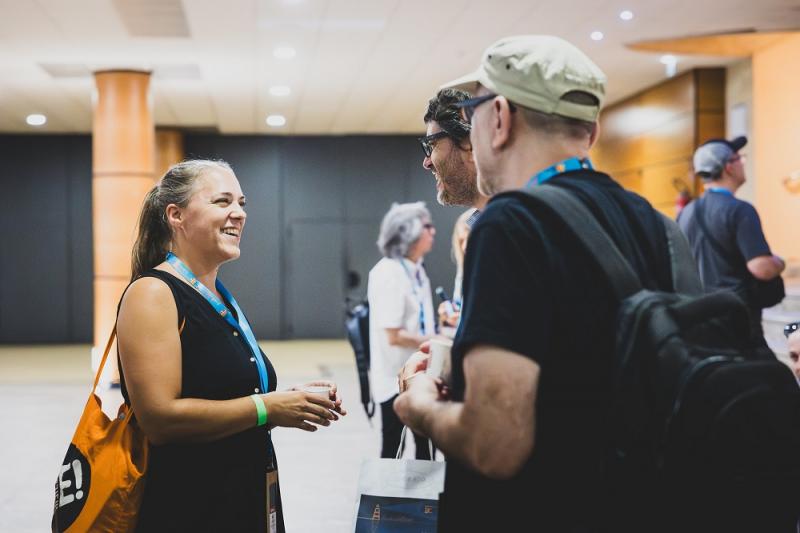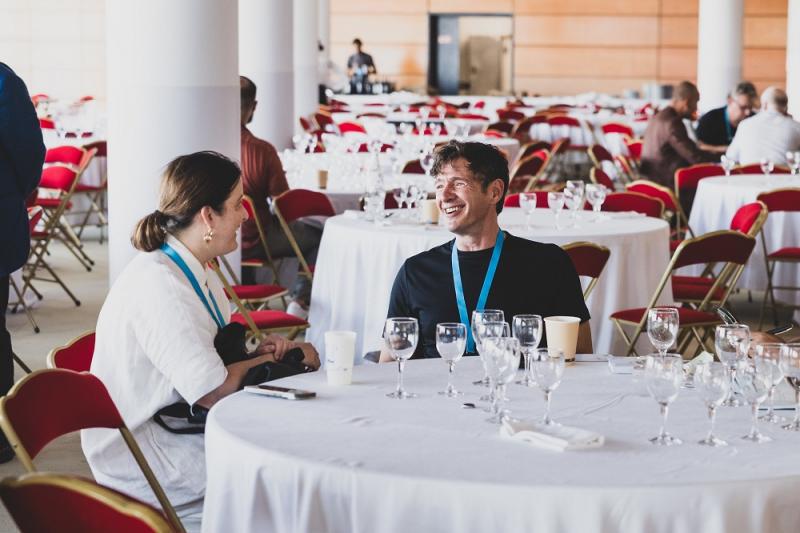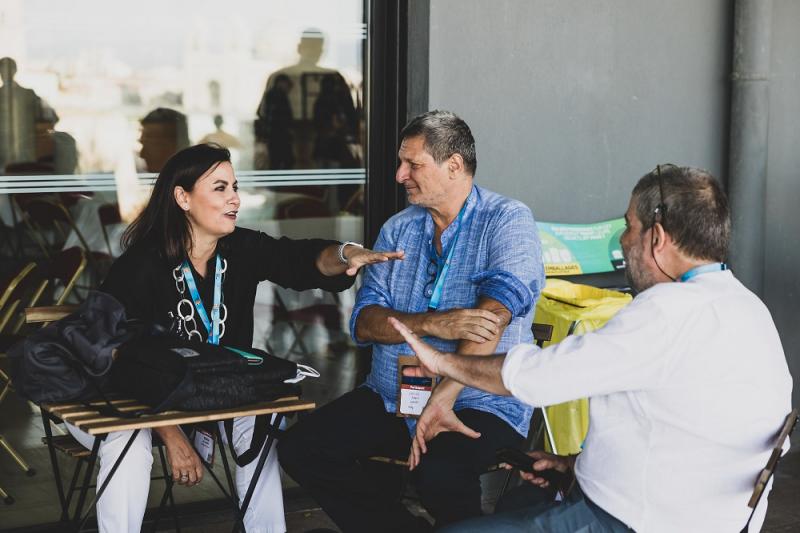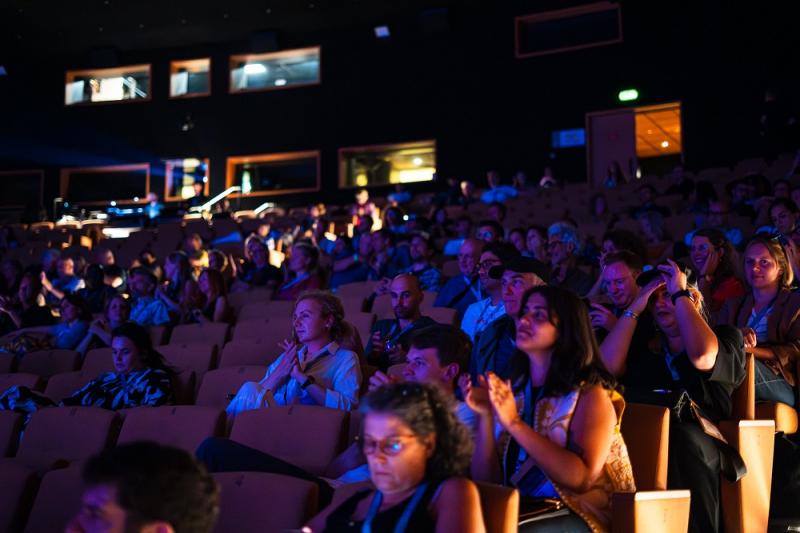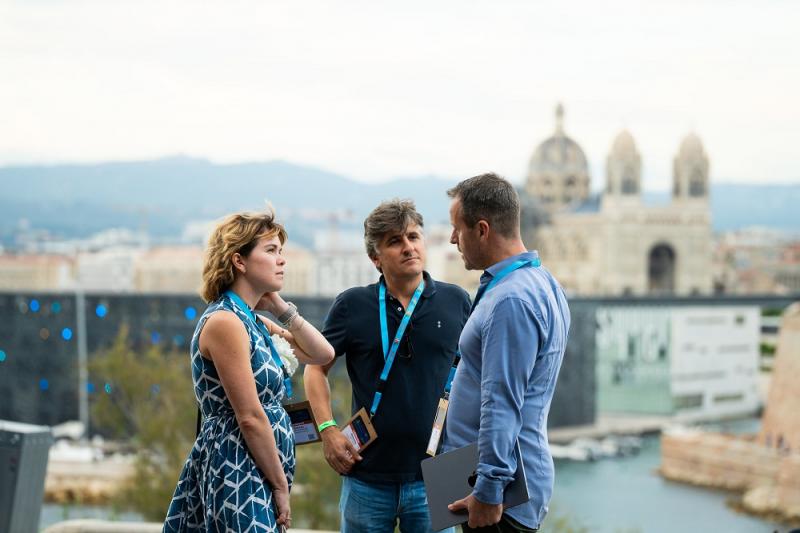Home » Jazz Articles » Live Review » European Jazz Conference 2023
European Jazz Conference 2023
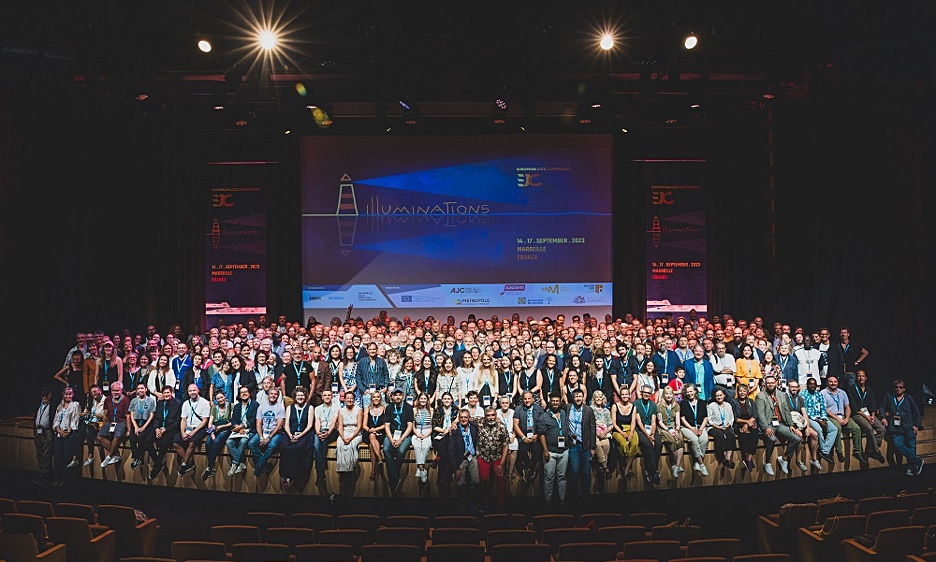
Courtesy EJN/Clara Lafuente
Evidently, the European Jazz Conference assumes significance on an increasingly global scale.
Palais du Pharo
Marseille, France
September 14-17, 2023
The smell of the sea and the warm caress of sunshine were like welcoming arms as the southern Mediterranean city of Marseille played host to the 9th edition of the European Jazz Conference.
Founded by Greeks in c. 600 BC, Marseille is the oldest city in France and one of the oldest continuously inhabited cities in Europe. For four days, a record 490 participants congregated in this historic port-city to talk, exchange ideas and listen to the best of French jazz.
Marseille's position as a gateway to trade with the Middle East and North Africa, and France's past as a colonial power, are reflected in the city's diverse demographics. Vietnamese, Lebanese, Senegalese, Madagascan, Martinican, Mayottan, North African, Comorian and southern Mediterranean communities, amongst others, make for a vibrant cultural stew.
This melting-pot identity is also true to some degree of the Europe Jazz Network, which has grown from an Italian-led initiative in 1987, to a Europe-wide network of jazz professionals spanning forty countries. Collectively, they program over 40,000 concerts a year throughout Europe.
Demographics
The EJN is the first to admit that it needs to be more inclusive and more representative of the societies that, in various ways, it seeks to impact through programs of exchange, talent development, outreach to marginalized communities and education.It is still predominantly a white, middle-class organisation, though it scores highly on gender balance, not just in its membership, but in the key roles of administration, organisation and leadership. There is also a very healthy dose of youthful blood in its ranks.
As the years go by, the Europe Jazz Network and its annual European Jazz Conference have gradually expanded, welcoming new members from beyond Europe's borders. Credit must also be given to the European Jazz Conference's 9th edition for promoting a more inclusive environment by extending invitations to guests from Morocco, Senegal, the United States and, importantly, Ukraine.
Independently, music professionals representing organisations from Canada, the USA and India also attended.
Evidently, the European Jazz Conference assumes significance on an increasingly global scale.
Partnering the EJN in organising the conference was Marseille Jazz des Cinq Continents. Additional support came from Centre Nacional de la Musique, Association Jazzé Croisé, La Sacem and the Creative Europe program of the European Union.
The venue for the 9th European Jazz Conference was the splendid 19th-century Palais du Pharo, with its magnificent view of Marseille port. Formally, keynote speech and panel debate in the main auditorium, and focused discussion groups in the breakaway rooms, addressed the EJC's core issues of education, inclusion and environmental sustainability. Informally, much of the horse trading unfolded over food and drinks.
Like any international conference on this scale, the EJC's carbon footprint is not insignificant. That said, the Europe Jazz Network is committed to searching for ways to lessen its environmental impact. For several years now, green touring initiatives have been trailed. Plastic water bottles have disappeared from European Jazz Conferences and the bulk of materials used are recyclable or biodegradable. Meat was off the menu for the conference lunches and dinners.
Despite the intensity of the four-day program, the EJC is a relaxed tribal gathering. Informally, over lunch, dinner and evening socializing, old acquaintances were renewed, new friendships cemented and the seeds of future collaborations planted.
Talk was plentiful, so too was music. From the opening concert of the Orchid Big Band to the closing gala concert of legendary French jazz musician Michel Portal, conferences attendees were treated to eighteen showcase and fringe concerts of uniformly excellent quality and of amazingly diverse stripes. [see separate review}
Under the banner of Illuminations, education was the theme of this year's conference. The questions raised over the course of the conference weekend were many. Essentially, however, the spotlight was focused on ways in which education can have a positive societal impact, and the roles and responsibilities of Europe Jazz Network members in this process.
Not all the questions raised were definitively answered by any means, but the European Jazz Confernece is as much about raising awareness of issues and asking its members to go back home with their thinking caps on.
Keynote Speech: Nicole Mitchell
A Musical Village of Interdependence: Creative Music as a Platform for Collaboration and Problem Solving
Since the 1990s, flautist/composer Nicole Mitchell has enjoyed a prolific career as the leader of her Black Earth and Black Earth Ensemble projects. A long-term member of the Association for the Advancement of Creative Musicians (AACM), Mitchell featured on the Art Ensemble of Chicago's We Are On The Edge: A 50th Anniversary Celebration (Pi Recordings, 2019).An experienced educator, Mitchell has held professorships at the University of California and the University of Pittsburgh. She is also the author of The Mandorla Letters: for the hopeful (The Green Lantern Press, 2022)—an impassioned manifesto for equality, collaboration and alternatives to western notions of progress. The main ideas from this book surfaced during her talk.
With her vast experience, leadership qualities and concern for the environment, Mitchell seemed like an inspired choice as key-note speaker. Yet this was a somewhat rambling presentation that lacked cohesion and clarity. Nor did it help that slides depicting quotations and photos of Mitchell's numerous projects flipped from slide to slide in a repetitive loop while she spoke.
The constantly changing slides were a distraction as attention flitted between speaker and images. The pause button, elemental in slide-show presentations, would surely have helped bring some control and sequential logic to a talk that frequently felt random and improvised.
There were, however, plenty of nuggets of wisdom and sage advice on better ways to live and interact with each other and with our natural environment. Mitchell's essential message was the power of creative music ensembles and communities—like the EJN—to "redefine the microcosm of the society we want."
Likening humanity to a bouquet of flowers, Mitchell heralded each person's distinctive qualities and ways of thinking as assets. She called for a rethink around the notion of traditional hierarchies—a levelling of the playing field—whereby each voice carries equal weight.
This may seem like a utopian idyll, but given today's reality of war-ravaged countries, populations living under dictatorships, global economic and gender inequality and multiples threats to the environment—all of which lead to death, destruction and mass migrations—the idea that new thinking is required is hard to argue against.
Michell invited new kinds of listening and spoke about how festivals should aspire to make people from diverse backgrounds feel welcome. She also suggested mentorship programs, topics that are already very familiar to most EJC participants. "What does a world that loves all of us look like?" Mitchell asked, rhetorically.
The Q&A that followed raised examples of different ways of learning from people's stories of success, failure and innovation, and of the lessons—and progress— that can be derived from situations of conflict—rupture or resolution.
If there was an underlying message to emerge from Mitchell's keynote speech, it was that music can and therefore should bring about social inclusion, promote harmony and challenge hierarchies—all in the name of a better world.
In a way, Mitchell was preaching to the converted, but it never hurts for an organisation and its individual members to be reminded of their core values and to be asked whether there is more that they could do and perhaps do better.
Parallel Discussion Groups
After lunch, delegates broke off into six discussion groups. Subjects included: non-formal education in the field of artistic development; music education's responses to ever-changing societies; growing the next generation of directors, producers and communicators; approaches to engaging new and diverse audiences; working towards more sustainable European touring circuits; fairer practices in the creative music sector.Each discussion group was steered by a moderator, who led two or three-person panels with experience in relevant fields.
It seemed that diversification and inclusion were watchwords in most discussion groups, but as UK journalist and broadcaster Kevin Le Gendre noted, we need to be careful when we talk about diversity because "diversity means different things to different people."
For some, diversity means different religions or ethnicities. For others, diversity means different political and socio-economic status. For others still, diversity means more in terms of gender-identity and sexual politics. These are all issues that can provoke radically divided opinion, censorship and violent oppression in certain parts of Europe.
It was fascinating to hear Xavier Lemettre, director of the Banlieues Bleues Festival in Saint-Seine-Denis, describe the strong reactions to its poster used to promote the festival's 40th anniversary in 2023.
The poster featured a photo, taken at the Banlieues Bleues Festival in 1989, of Miriam Makeba and Nina Simone kissing. Lemettre recounted how the poster was greeted with upset, scorn and outrage in certain sections of society.
Perhaps French society is not quite as egalitarian, libertarian and fraternal as it would like to believe—a charge, in fact, that could be levelled at most countries.
Panel Debate
Everything is illuminated: How can we make music education more inclusive and, in doing so, contribute to a more inclusive society
Saturday morning's panel debate picked up where the previous day's discussion groups had left off. The panel, moderated by UK writer and broadcaster Anna Umbina, featured Paris-based Palestinian singer Kamilya Jubran, Belgian saxophonist Fabrizio Cassol and French saxophonist and director of Marseille Conservatory, Raphael Imbert.In response to Umbina's opening question, all three gave personal examples of inclusive projects that worked. Jubran, a Palestinian born in the north of the modern state of Israel, related the story of her band Sabreen, which also featured musicians from occupied East Jerusalem of the post-1967 division. They were two different kinds of Palestinians, as Jubran put it, "living two different kinds of occupation."
For the twenty years that Jubran was lead singer in Sabreen, the band toured throughout Palestine and Israel, building a broad following and inspiring younger musicians by demonstrating that they would not be defined or confined by borders.
Two intifadas and Israel's notorious wall later, the conditions endured by Palestinians have made everything much more complicated than in the time of Sabreen.
Imbert gave some background history on the Marseille Conservatory before describing the challenges of bringing people to the Conservatory due to the sheer size of the city and the difficulties faced by many navigating public transport. It is necessary to represent the demographics of the city, which is why the Conservatory is creating an Arabic music class and a "department of orality" representing the street culture of hip hop and rap.
To encourage inclusivity, fees are extremely low, but for the most economically challenged, financial help is given. Children between the ages of 6 and 10 from disadvantaged areas of the city are invited to join special orchestras where they are taught instruments. Importantly, Imbert said, they are considered as Conservatory students like any other student studying there.
Fabrizio Cassol began by saying that every group or project by definition, includes those who are "in" and those who are "out." Cassol then spoke about a project he has been involved in since 2015, which brings men and women together to compose collectively for a band in a democratic manner.
Another project brought together 250 children from Marseille and 250 from Aix-en-Provence, aged 8 to 14, to sing in a concert. As Cassol explained, it was a job to convince the children to participate, but once trust had been established and the concert was held the children "did not want to leave the stage." Such projects, Cassol underlined, need to be motivated by love and with an understanding of the social conditions and aspirations of the participants.
Making the effort to cross boundaries, whether geo-political, economic or cultural, the participants agreed, is the way to make arts projects truly inclusive. But, as Cassol noted, bringing together those who are "in" with those who are "out" is a very delicate process, because it is the empowered—those with access to a culture—who are bringing the disempowered—those without access—into an unfamiliar world. Love, trust, respect and dignity were the watchwords from this panel debate.
Recognition of A Job Well Done
Since 2012, the EJN has chosen a festival or venue for its EJN Award for Adventurous Programming. All EJN members can nominate a festival or venue, including those outside EJN membership. A jury then studies the list and duly selects the winner. The winner for 2023 was A L'ARME! festival in Berlin, Germany, which was praised for having established a reputation in just over a decade as "a reference for avant-garde jazz, experimental and improvised music."Founder and Artistic Director Louis Rastig accepted the award and paid tribute to the festival's executive director Karina Mertin. He also credited the Moers Festival—a previous winner of this award—for the inspiration to run festivals in the first place.
In 2019, the EJN introduced a new award for services to Music and Community. The 2023 winner was B: Music from Birmingham, UK, for its outstanding and inspirational work with "vulnerable communities that do not always have access to cultural participation." Alexandria Carr was unable to collect the award personally, so Steve Meade, Artistic Director of Manchester Jazz Festival accepted the award on her behalf and paid tribute to the work that B: Music does in challenging circumstances.
There was special recognition for former EJN president Jan Ole Otnæs, who was made an honorary lifetime member of the EJN. This came after Otnæs was also awarded the King's Merit Medal for outstanding service to Norwegian jazz and music in general. Since the late 1960s, Otnæs has promoted countless jazz concerts, notably as Artistic Director of Molde International Jazz Festival and then as managing director of Nasjonal Jazzscene—Victoria. His has been a life of dedication and service to the music.
The day still held another seven showcase and fringe concerts, with delegates socializing continuing in the warm Marseille air late into the night. The following morning, for those able to drag themselves out of bed, a choice of cultural tours showed off some of Marseille's famous quarters and landmarks.
Wrap Up
As EJN membership grows year upon year, and as attendance at the European Jazz Conference does likewise, the logistical task becomes ever greater. This edition, the biggest to date, was held against the backdrop of France hosting the Rugby World Cup and a week before a Papal visit. Simply securing hotel rooms for so many conference participants within walking distance of the conference venue was a coup in itself.It was fitting that the EJN's three chief administrators and organizers, Francesca Cerretani, Giambattista Tofoni and Stefano Zucchiatti, received the loudest and most prolonged ovation from the conference delegates. In conjunction with their French partners and the essential volunteer team, they helped to deliver an excellent conference, but their year-round work is vital in oiling the cogs of the EJN machine.
EJC Marseille 2023 was a resounding success. It illuminated the social and educational role that music can play in society and the barriers that still exist to wider participation. The work goes on.
The 2024 European Jazz Conference will be held in Ghent, Belgium, from September 12-15.
Related Photos
< Previous
Grooveyard
Next >
The Defector
Comments
Tags
Live Review
Nicole Mitchell
Ian Patterson
France
Marseilles
Michel Portal
Association for the Advancement of Creative Musicians
We Are On The Edge: A 50th Anniversary Celebration
Fabrizio Cassol
Raphael Imbert
european jazz conference
Europe Jazz Network
Concerts
For the Love of Jazz
 All About Jazz has been a pillar of jazz since 1995, championing it as an art form and, more importantly, supporting the musicians who create it. Our enduring commitment has made "AAJ" one of the most culturally important websites of its kind, read by hundreds of thousands of fans, musicians and industry figures every month.
All About Jazz has been a pillar of jazz since 1995, championing it as an art form and, more importantly, supporting the musicians who create it. Our enduring commitment has made "AAJ" one of the most culturally important websites of its kind, read by hundreds of thousands of fans, musicians and industry figures every month.

